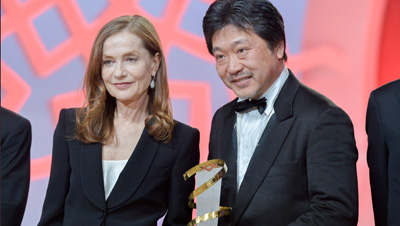
- Industry
Marrakech Film Festival Comes of Age
The Marrakech International Film Festival was founded by the king of Morocco, Mohamed IV, and his brother prince Moulay Rashid, 13 years ago, and is run in cooperation with a French organization, which gives it a distinctive European feel and a French flavor.
The festival began under a cloud, in December 2001, just a few months after the 9/11 attack, but it grew in scope and importance ever since. It has attracted European and American artists, most prominent and active among them director Martin Scorsese, who helped found a leading cinema school in Marrakech, the ESAV, in 2007, and who was the festival’s jury president in 2013. In an interview Scorsese said, “for me, Morocco and the movies have always gone hand-in-hand, so when the festival was founded back in 2001, I was eager to help out. Over the years, I’ve seen it become something very special, a real home for cinema in a beautiful setting. Marrakech has glamour and prizes, but they take a back seat to the movies themselves. That’s very rare.'”
Marrakech is a fabled city of colors – awash in the ochre of its buildings and the blue skies, and of scents – of oranges, jasmine and spices; all framed by the snow capped Atlas mountains on the horizon. In 2014, the MIFF took over the newly opened Palais des Congres, with its 2,000 theater seats, flowing public spaces, all marble splendor, with some Moroccan architectural touches. At night one can see the festival site all bathed in floodlights, surrounded by red carpet walks and several rings of security, all occupying a city block where two major boulevards meet. With its formal dress code, acres of red carpet, bright lights and evening gowns it has the feel of a Cannes of the desert.
The festival is programmed for three different sites: Tributes, premieres and ceremonies at the Palais, non-stop re-screenings from morning to midnight at the Colisee, and big action, large scale movies for the giant outdoors El Fna screen. The best part: it is all free. While choice events are by invitation, the rest are by free daily passes, with some 30,000 distributed.
Guests conducted master class workshops (Directors Billie August and Benoit Jacquot) and a side competition showed shorts made by Moroccon cinema students.
This year the Festival showcased Japanese cinema, inviting a delegation of some 15 directors and actors, and showing 25 Japanese movies, ranging from classics by Mizoguchi and Ozu, to the latest features.
What also distinguishes MIFF is it’s programming of dynamic first films that might be overlooked at other festivals: more than half of the 15 films in competition were directed by first-timers. Said the Festival’s director since 2004, Bruno Barde of the French Le Publique Systeme Cinema: “It’s not that I wanted to focus on that specifically, it’s just the kind of energy I wanted to find in films … I think in the impulse of the first film, there’s not only something of the future of the director but the future of cinema.”
Under this year’s jury president Isabelle Huppert, the festival honored a handful of independent, strong voices, that examine dark corners of our world: The jury grand prize – the Golden Star – winner went to Russian Ivan Tverdovsky’s Corrections Class described by one reviewer as “a fascinating mixture of John Hughes and Lars Von Trier.”
Members of the Hollywood Foreign Press Association also attended the 14th edition of MIFF to promote recognition of the Golden Globes. Yoram Kahana and Mario Amaya met with Ms. Myriam Chemaou, the Festival’s Chief of Development to present a commemorative plaque, in recognition of the establishment of a relationship between the HFPA and the MIFF.
After the Festival, Ms. Chameu wrote the HFPA delegates: “We will be glad to see you again next year at the Marrakech Festival.”
The HFPA will be glad to return to the Festival and the magical city that hosts it.
Yoram Kahana